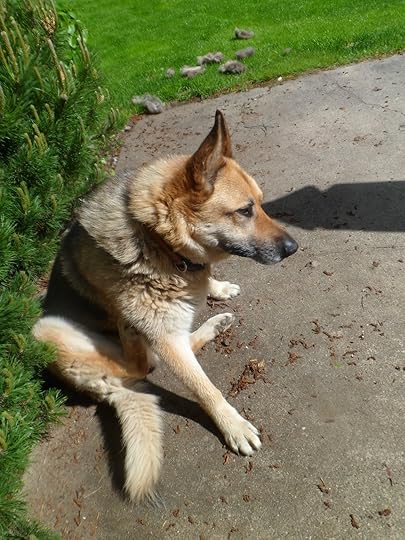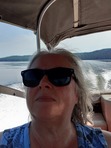Susan Smith-Josephy's Blog, page 4
September 8, 2013
Welcome to HELL. The Hell's Gate Air Tram, that is.
First, of all, The Hell's Gate Air Tram is not the least bit hellish.
Here, take a look:
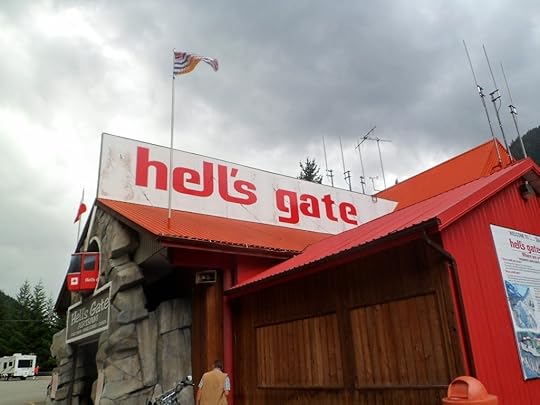 You enter Hell's Gate Air Tram from the building on Hwy 97.
You enter Hell's Gate Air Tram from the building on Hwy 97.
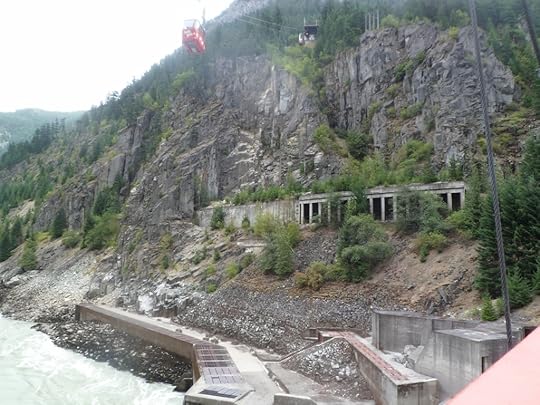 Then you descend, in a perfectly safe, Swiss-made air tram
Then you descend, in a perfectly safe, Swiss-made air tram
over the terrifying Fraser Canyon, downward, where only
a few minutes later, you reach the other side of the river.
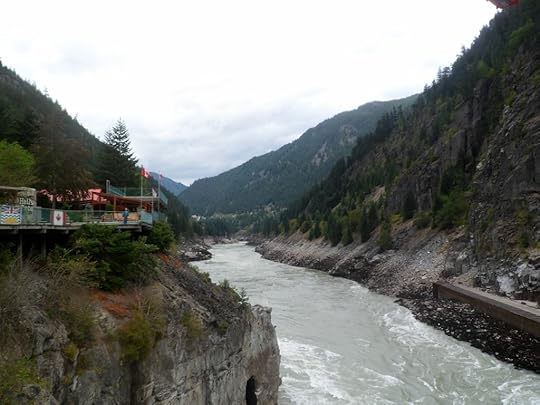 Here is a view from the suspension bridge. The buildings on the left include a museum,
Here is a view from the suspension bridge. The buildings on the left include a museum,
a gift shop, ice cream and fudge, and a nice cafe.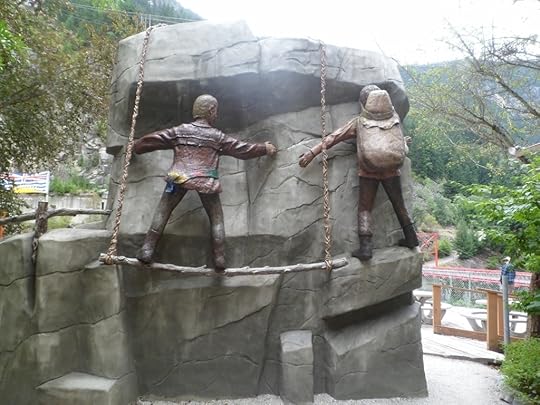 Make sure you take a walk around and see the public art,
Make sure you take a walk around and see the public art,
including sculptures and murals.
Check out the Hell's Gate Air Tram website for rates, location, hours and tons of great info.
Here, take a look:
 You enter Hell's Gate Air Tram from the building on Hwy 97.
You enter Hell's Gate Air Tram from the building on Hwy 97.
 Then you descend, in a perfectly safe, Swiss-made air tram
Then you descend, in a perfectly safe, Swiss-made air tramover the terrifying Fraser Canyon, downward, where only
a few minutes later, you reach the other side of the river.
 Here is a view from the suspension bridge. The buildings on the left include a museum,
Here is a view from the suspension bridge. The buildings on the left include a museum,a gift shop, ice cream and fudge, and a nice cafe.
 Make sure you take a walk around and see the public art,
Make sure you take a walk around and see the public art,including sculptures and murals.
Check out the Hell's Gate Air Tram website for rates, location, hours and tons of great info.
Published on September 08, 2013 16:42
Denmark: A Conspiracy of Faith: A Department Q Novel by Jussi Adler-Olsen (as part of the #EarthReading project)
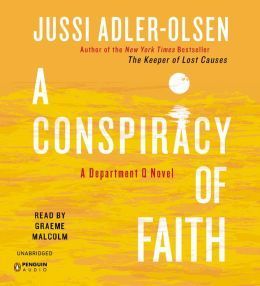 Reasons this book was chosen:
Reasons this book was chosen: It fits the qualifications (written by a Dane and set in
Apologies: This is a third novel in a series. Why didn't I choose the first? Well, I just grabbed it off the shelf and it was good as a stand-alone novel, so I just went with it.
Bonus: It's a mystery novel.
Downfall: It's a 504-page hardback, so my wrists were aching by the time I'd finished it.
Review: Great, I loved it. The main character is Detective Carl Mørck. Conspiracy of Faith was published in Danish as Flaskepost fra P (Message in a Bottle) - third volume in the Department Q series. Department Q is in charge of solving cold cases. This mystery is a fine balance of psychopathic murder, missing children, serial kidnapping, moody local scenes and intriguing characters.
Author Jussi Adler-Olsen has a sexy pic of himself on his website. His bio is fascinating, he's done all sorts of things.
Conclusion: I will read everything that this author has to offer.
Read more bout the #EarthReading project here and here.
Reminder: I'm always looking for guest bloggers for the #EarthReading project, so send me a DM via Twitter to @susmithjosephy or email me via my website.
Next country: TBA! (soon)
Published on September 08, 2013 14:08
August 16, 2013
The first name I'm gonna call.... Denmark
What I know about Denmark:
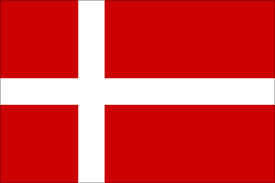
Not much.
But here goes.
I visited Denmark in 1990. I had an appointment to meet a friend of mine, Anders B., from Sweden. Anders was going to come over from Sweden on the ferry, meet me in Copenhagen and we would do tourist stuff.
From Belgium, where I had been staying, it should have been relatively easy to take a reliable European train to Denmark, right? Right. Except I fell asleep and ended up in Germany, very confused and sad that I was going to be late meeting Anders who, after all, had left his country to come and visit with me. Because I was tired, sad and mad, I started to cry and solid blonde people all patted me kindly and said, in thick accents "Don't try, don't try," which I thought was rather sweet and I cried even more.
Eventually, within minutes, it was all sorted, and I was bundled off to the proper train and ended up in Copenhagen where I met up with Anders, on time. Anders, for some reason, collected the little cardboard trays that hot dogs are served on. He was also very excited because in Denmark, unlike Sweden, there was a certain red dye allowed in some long thin hot dogs (or wieners or whatever the heck they were called) that was ONLY allowed in Danish hot dogs. I could not understand why he cared, but politely agreed that yes, certainly, he must have a thin, long, red-dye-including hot dog from a street stand. He ate it (I was going to say "with relish" but that would be a terrible pun), and carefully folded away the little cardboard tray. I got a frisson of fear. Was he THAT odd? I didn't really know him well at all. He was just an ex-boyfriend of a friend of mine. Was Anders going to kill me? This was all a long time ago now, and of course much before Nordic Noir became so popular. Could it be that my frisson was FORESHADOWING for an entire genre of literature?!
Anyway. Off we went to Tivoli Gardens which turned out to be sort of an amusement park and I wasn't too keen, but walked around keeping my mouth shut, desperately wanting to go to a museum or bookshop or something.
Finally, we ended up taking a bus to Roskilde to the Viking Museum which was great.
I don't know ANYTHING about Denmark, obviously, except that it was very cute, tidy and the people were kind. Oh, yes, and I saw the mermaid statue.
Other random facts I know about Denmark, without Googling. I remember I read they were the happiest people on earth. Or was it the saddest? Or was that Finland? Or dentists. Now do you see why I need to read a book from every country on earth? I'm not going to even pretend for one minute that reading a book about a country will give me insight.
In my next post I will reveal the novel I have chosen to represent the entire country and population of Denmark. Don't be mad, Danes.
Hey, follow me on Twitter, if you like @susmithjosephy
Hastag #EarthReading y'all

Not much.
But here goes.
I visited Denmark in 1990. I had an appointment to meet a friend of mine, Anders B., from Sweden. Anders was going to come over from Sweden on the ferry, meet me in Copenhagen and we would do tourist stuff.
From Belgium, where I had been staying, it should have been relatively easy to take a reliable European train to Denmark, right? Right. Except I fell asleep and ended up in Germany, very confused and sad that I was going to be late meeting Anders who, after all, had left his country to come and visit with me. Because I was tired, sad and mad, I started to cry and solid blonde people all patted me kindly and said, in thick accents "Don't try, don't try," which I thought was rather sweet and I cried even more.
Eventually, within minutes, it was all sorted, and I was bundled off to the proper train and ended up in Copenhagen where I met up with Anders, on time. Anders, for some reason, collected the little cardboard trays that hot dogs are served on. He was also very excited because in Denmark, unlike Sweden, there was a certain red dye allowed in some long thin hot dogs (or wieners or whatever the heck they were called) that was ONLY allowed in Danish hot dogs. I could not understand why he cared, but politely agreed that yes, certainly, he must have a thin, long, red-dye-including hot dog from a street stand. He ate it (I was going to say "with relish" but that would be a terrible pun), and carefully folded away the little cardboard tray. I got a frisson of fear. Was he THAT odd? I didn't really know him well at all. He was just an ex-boyfriend of a friend of mine. Was Anders going to kill me? This was all a long time ago now, and of course much before Nordic Noir became so popular. Could it be that my frisson was FORESHADOWING for an entire genre of literature?!
Anyway. Off we went to Tivoli Gardens which turned out to be sort of an amusement park and I wasn't too keen, but walked around keeping my mouth shut, desperately wanting to go to a museum or bookshop or something.
Finally, we ended up taking a bus to Roskilde to the Viking Museum which was great.
I don't know ANYTHING about Denmark, obviously, except that it was very cute, tidy and the people were kind. Oh, yes, and I saw the mermaid statue.
Other random facts I know about Denmark, without Googling. I remember I read they were the happiest people on earth. Or was it the saddest? Or was that Finland? Or dentists. Now do you see why I need to read a book from every country on earth? I'm not going to even pretend for one minute that reading a book about a country will give me insight.
In my next post I will reveal the novel I have chosen to represent the entire country and population of Denmark. Don't be mad, Danes.
Hey, follow me on Twitter, if you like @susmithjosephy
Hastag #EarthReading y'all
Published on August 16, 2013 14:09
August 12, 2013
So, this is how I'm going to do it. (Read books from every country on earth)
Welcome again and thanks for joining in my quest for #EarthReading where I read a book from every country on earth.
General principles and specific details:
I'm doing this for enjoyment, not enlightenment. Because, in my experience, as soon as something is "good for me" I get stroppy. Therefore, I will be avoiding "the classics" and going for different choices. The story and characters have to be engaging but the meaning doesn't have to be deep. Do I sound shallow now? A literary lightweight? Keep reading.
The books will be picked randomly, using Twitter recommendations, Goodreads country lists, and by asking booksellers and librarians. I will use the "serendipity of the stacks" method that I used in undergrad and look how that turned out. Yes, you may mail me books.
While, ideally, the books I read will be novels, in some cases they may be short story collections, creative non-fiction, poetry, graphic novel, comic book, children's book. You get the idea.
The book must be written by a person from that country and about that country. I will try and read a semi-fair balance of female and male authors.
Due to my feeble linguistic abilities, the book must be either written in English or translated into English.
I'm going to try and read the type of books for which that country is known, and the first example of that will be in an upcoming blog post.
The countries and their books will not be presented in alphabetical order because it would just create delays in me trying to obtain books from certain places. As they appear, they shall be read.
Guest bloggers welcome, just type a comment below or DM me or contact me via Twitter @susmithjosephy and let me know which country you wish to delve into, and I'll see if it's still available. I've got a list going.
Each book choice will be prefaced by an introduction about the country, to the best of my ability. This is not a maphead exposition, so the geographical, social and political comments will be my ignoramus feelings on the particular country, any previous knowledge of the place, plus a paragraph of what I hope will help with background. Guest bloggers will also do this.
The hashtag shall be #EarthReading and #EarthReading shall be the hashtag.
Wish me luck on my literary journey.
General principles and specific details:
I'm doing this for enjoyment, not enlightenment. Because, in my experience, as soon as something is "good for me" I get stroppy. Therefore, I will be avoiding "the classics" and going for different choices. The story and characters have to be engaging but the meaning doesn't have to be deep. Do I sound shallow now? A literary lightweight? Keep reading.
The books will be picked randomly, using Twitter recommendations, Goodreads country lists, and by asking booksellers and librarians. I will use the "serendipity of the stacks" method that I used in undergrad and look how that turned out. Yes, you may mail me books.
While, ideally, the books I read will be novels, in some cases they may be short story collections, creative non-fiction, poetry, graphic novel, comic book, children's book. You get the idea.
The book must be written by a person from that country and about that country. I will try and read a semi-fair balance of female and male authors.
Due to my feeble linguistic abilities, the book must be either written in English or translated into English.
I'm going to try and read the type of books for which that country is known, and the first example of that will be in an upcoming blog post.
The countries and their books will not be presented in alphabetical order because it would just create delays in me trying to obtain books from certain places. As they appear, they shall be read.
Guest bloggers welcome, just type a comment below or DM me or contact me via Twitter @susmithjosephy and let me know which country you wish to delve into, and I'll see if it's still available. I've got a list going.
Each book choice will be prefaced by an introduction about the country, to the best of my ability. This is not a maphead exposition, so the geographical, social and political comments will be my ignoramus feelings on the particular country, any previous knowledge of the place, plus a paragraph of what I hope will help with background. Guest bloggers will also do this.
The hashtag shall be #EarthReading and #EarthReading shall be the hashtag.
Wish me luck on my literary journey.
Published on August 12, 2013 16:04
August 9, 2013
How many countries are there in the world?
So, I'm going to read a book from every country in the world.
I thought that would be easy. You know, just get a list of countries and start reading.
Googling "how many countries are in the world?" reveals a number of complications.
According to the United Nations, they have 193 members. So, I should read a book from every one of them, right? Well, yes, but that would still mean I was missing out the following countries:
Vatican City
Kosovo
Taiwan
That would make it up to 196, the number of countries generally assumed there is in the world.
HOWEVER, that fails to include various colonies and territories like:
Puerto Rico
Greenland
Bermuda
Palestine
Western Sahara
Scotland
Ireland
Wales
South Sudan
and more
In fact, I'm so far from being a maphead, I'm not going to even venture any further with any pretense of beginning to understand the complexities of geopolitics, self-rule, country recognition, or any of the rest of it.
I don't want to leave any country out, whether it's an official country or not. I don't want any angry Scots coming after me. Would you want that?
What I'm going to do, with people's help, is read as many books from as many distinct places as possible. Any tips and hints appreciated. I also am grateful, in advance, for any bitter rants, sharp tweets, and shady in-box messages about my lack of world geography knowledge.
Hey, I am on Twitter @susmithjosephy
My next post, I will introduce the "rules" for my #EarthReading project.
Yes, that is the hashtag I've chosen. Feel free to love it, as I do.
I thought that would be easy. You know, just get a list of countries and start reading.
Googling "how many countries are in the world?" reveals a number of complications.
According to the United Nations, they have 193 members. So, I should read a book from every one of them, right? Well, yes, but that would still mean I was missing out the following countries:
Vatican City
Kosovo
Taiwan
That would make it up to 196, the number of countries generally assumed there is in the world.
HOWEVER, that fails to include various colonies and territories like:
Puerto Rico
Greenland
Bermuda
Palestine
Western Sahara
Scotland
Ireland
Wales
South Sudan
and more
In fact, I'm so far from being a maphead, I'm not going to even venture any further with any pretense of beginning to understand the complexities of geopolitics, self-rule, country recognition, or any of the rest of it.
I don't want to leave any country out, whether it's an official country or not. I don't want any angry Scots coming after me. Would you want that?
What I'm going to do, with people's help, is read as many books from as many distinct places as possible. Any tips and hints appreciated. I also am grateful, in advance, for any bitter rants, sharp tweets, and shady in-box messages about my lack of world geography knowledge.
Hey, I am on Twitter @susmithjosephy
My next post, I will introduce the "rules" for my #EarthReading project.
Yes, that is the hashtag I've chosen. Feel free to love it, as I do.
Published on August 09, 2013 18:04
August 8, 2013
Around the world in 196 (or more) books OR People of Earth, send me your books
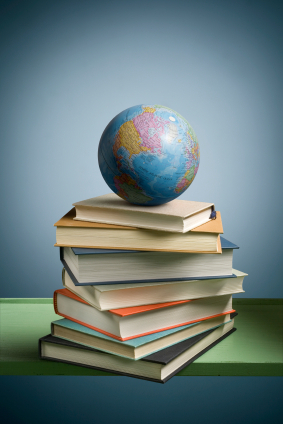 istockphoto
istockphotoA world of books awaits!I was on Twitter today. Which is nothing new, because I'm on there every day. But today, among all the political commentary, book promos, cat videos and jokes, I came across a comment from a friend that sparked something in my mind.
She said she wanted to read a book by a Caribbean writer and I responded that I would, too. Then I thought: why have I never read a book by a Caribbean writer? And it got me thinking even more.
Why stop at the Caribbean? Why not the world?
I've decided that my reading habits are becoming increasingly insular, when it comes to novels, anyway.
Non-fiction has always been easy for me to read. A new subject comes up and I'll buy or borrow a book or two on the subject. I've got reference books galore, dictionaries everywhere, and bookshelves categorized by subject: history; languages; science.
But novels? Not so much.
To be honest, I prefer a mystery novel to any other sort of novel. I'm not a fan of 'classic literature' whether it be Jane Austin or J.R.R. Tolkien. So reading novels that are supposedly good for me is going to be a bit of a slog. I think. Maybe.
Lately, I've taken to entering contests and have been winning a ton of good books, and am ploughing through them. But it's NOT ENOUGH. I need more (or moar, if you prefer).
So, the idea popped into my mind to read a novel from every country on earth. How many countries are there on earth, I asked myself? And even that isn't an easy answer to get. So, I have four goals.
1. Determine how many countries on earth (depends on definition).
2. Read a novel from each location.
3. Write about each novel I read.
4. Create an e-book out of all my blog posts on this subject.
My next post will address point number one.
I will keep you posted!
Disclaimer: I'm well aware (sigh) that this #EarthReading project is a mere diversionary and procrastinatory technique to keep me from editing the 100,000 words I have done on my second book. Don't worry, I'm still editing that, too. Shameless self-promotion: It's a non-fiction history book on a fascinating guy called Jean Caux, aka Cataline, who was a mule train packer in British Columbia in the 1800s and early 1900s. Read about him here.
BTW, follow me on Twitter, ok? @susmithjosephy
Published on August 08, 2013 10:04
June 25, 2013
Wilds to Riches documentary
I'm doing editorial revisions on my manuscript for a book I'm writing about Jean Caux, also known as Cataline. He was a pack train operator who came to British Columbia in 1858, and worked at his profession until he retired in 1912. A long haul (pun intended)!
Because his career spanned such a long time, I've got files for each decade, and I'm working on the 1890s right now. A busy time in British Columbia, and culminating with the building of the Yukon Telegraph in 1899, which was a response to the Yukon Gold Rush. Government and industry wanted a way to keep in touch with the remote and somewhat mysterious Klondike.
Cataline also he packed for the miners and merchants of the 1862 Cariboo Gold Rush. So I was OK with sneaking a bit of time away from writing and editing this morning to look at the trailer of a CBC documentary that's showing on July 6th at 7 pm. "Wilds to Riches" is about the characters who have come to the Cariboo country to seek gold--both past and present. Starting in 1862 and up until right this minute,the search for gold has been a draw, an entrancement and an addiction for many. Some strike it rich, but many more go home broke.
This documentary interests me in two ways. First, because Jean Caux, the guy I'm writing about, packed for years into the Cariboo country. He and his pack train of mules and horses brought supplies up from Yale and later Ashcroft into this area to supply the local miners, merchants, farmers and everyone else. Unless you've ever lived or visited here, and travelled the back roads and trails, you can't imagine how hard these packers worked. Everyone worked hard in those days. The miners had it rough, too. Terrible living conditions, mud in the summer, insects, poor food, and bad liquor. In the winter, cold cold cold, and lots of snow. Many left during the winter for warmer places like Victoria, but some toughed it out and stayed through the coldest months.
And of course, the documentary interests me because I live in Quesnel, in the heart of the Cariboo country. The fabulous historical gold rush town of Barkerville is just down the road, bringing history to life. I have friends and relatives who have placer gold claims, and the signs of how important gold is to the economy are everywhere. Isn't it thrilling, in a way, to know that the shout of "gold" is just a mountain away?
The documentary looks great, and I'm marking the date on my calendar. Check out the trailer here:
Because his career spanned such a long time, I've got files for each decade, and I'm working on the 1890s right now. A busy time in British Columbia, and culminating with the building of the Yukon Telegraph in 1899, which was a response to the Yukon Gold Rush. Government and industry wanted a way to keep in touch with the remote and somewhat mysterious Klondike.
Cataline also he packed for the miners and merchants of the 1862 Cariboo Gold Rush. So I was OK with sneaking a bit of time away from writing and editing this morning to look at the trailer of a CBC documentary that's showing on July 6th at 7 pm. "Wilds to Riches" is about the characters who have come to the Cariboo country to seek gold--both past and present. Starting in 1862 and up until right this minute,the search for gold has been a draw, an entrancement and an addiction for many. Some strike it rich, but many more go home broke.
This documentary interests me in two ways. First, because Jean Caux, the guy I'm writing about, packed for years into the Cariboo country. He and his pack train of mules and horses brought supplies up from Yale and later Ashcroft into this area to supply the local miners, merchants, farmers and everyone else. Unless you've ever lived or visited here, and travelled the back roads and trails, you can't imagine how hard these packers worked. Everyone worked hard in those days. The miners had it rough, too. Terrible living conditions, mud in the summer, insects, poor food, and bad liquor. In the winter, cold cold cold, and lots of snow. Many left during the winter for warmer places like Victoria, but some toughed it out and stayed through the coldest months.
And of course, the documentary interests me because I live in Quesnel, in the heart of the Cariboo country. The fabulous historical gold rush town of Barkerville is just down the road, bringing history to life. I have friends and relatives who have placer gold claims, and the signs of how important gold is to the economy are everywhere. Isn't it thrilling, in a way, to know that the shout of "gold" is just a mountain away?
The documentary looks great, and I'm marking the date on my calendar. Check out the trailer here:
Published on June 25, 2013 09:50
June 17, 2013
Interview: The adventurous, reflective Rhea Rose
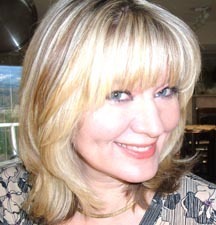 SSJ:Tell us about yourself.
SSJ:Tell us about yourself. RR: I call myself a dual citizen. I work as a Language Arts and Fine Arts teacher in an alternate program, but I also have a full-time interest in writing. I write short stories, poetry, and lately, I’ve written a webisode series that I will turn into a novel series, too. I just completed the MFA (creative writing) program at UBC.
What are your newest works?
This year (2013) I have three short stories coming out in three different anthologies. My first story, “Leaf Man” has appeared this spring, April, in Masked Mosaic Canadian Super Stories, published by Tyche Books (rhymes with Nike); the next anthology is called Dead North and it’s a collection of Zombie stories published by Exile Books.
My story is called, “The Adventures of Dorea Tress,” and this collection will be out in October 2013. The last story, “The Wall” will appear in an anthology called Tesseracts 17, again in the late fall, published by Edge Press. So far, it’s been a good year for short stories.
What else is new with you? At the moment I’m on a personal crash course in marketing my writing online. Although I have always published through the traditional method, mail out, get rejected, mail again, most writers know the traditional publishing world has been knocked from its kingpin position by the onslaught of epublishing. This change of venue for writers requires us to become better marketers of our own work; she who knows how to blog, tweet, build a website, and crowd source, then write a good book, will do well.
That being said, I am still earning to think differently about how I approach my own writing projects. I decided to graduate from UBC with a webisode, the writing of which was very much like writing a novel. I created a world and characters and dialogue, now I can finish the job by turning the stories into novels, or produce them as webisodes or do both. Although the project is ready “to go” in terms of writing (that’s done), the marketing is not in place yet.
What did you learn during the writing process?
Can you give us any tips?
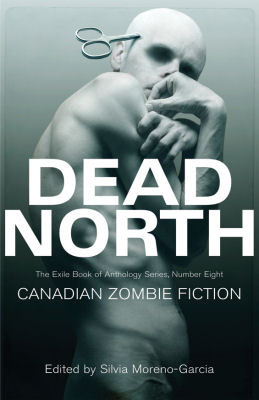
One of the best things I’ve learned to do is write anywhere. If you have a laptop or something small like that and learn to take it with you, like you do your purse and make yourself write, you will end up with completed projects. I’ve also learned that if you write it “they will come,” for those of you that remember the movie Field of Dreams. Today more than ever that holds true. Writers have become suppliers of content. Don’t ever throw away an idea. I once wrote a vampire story that I couldn’t sell for ten years. Everywhere I sent it, they said, “OMG, a vampire story. We don’t do those.” Then with the rise of the Twilight series, my vampire story became the hottest thing since, well, you know.
Tell us about your previous projects. I tend to be a short story writer and most of my work has been published in Canada, but some of it has been published in the US. In the world of Canadian speculative writing, which includes Science Fiction, Fantasy, Horror, Myth and anything in between, one of the writers’ awards is called the Aurora. I’ve been nominated for it, but have yet to win it.
What is it that you like about science fiction? Not just science fiction but the entire field of speculative fiction attracts me because it allows the adventurous side of me to explore realms that I can’t otherwise go to. There is much hullabaloo in the genre about the fact the Margaret Atwood insists that she doesn’t write science fiction, but it’s very clear to those of us that do, that she does also. That’s not to say that I don’t write literary fiction or don’t enjoy it, I do, and have published both short stories and poetry in more literary publications, but for now it’s not where I like to live most of the time.
What books are you reading right now?
I just finished the third book in the Game of Thrones series (George R.R. Martin) and a collection of short stories called, Objects of Worship by Claude Lalumiere. I am reading Cloud Atlas by David Mitchell, For One More Day by Mitch Albom and am about to start another short story collection called Push of the Sky by Camille Alexa, like most writer my reading list is infinite, eclectic and random. If someone puts a book in front of me and says read this I will, at some point.
Tell us about your next project.I’d like to bring some of the writing projects I began in my UBC classes to completion and get them marketed. My next big love is poetry and did do some serious poetry writing in a class with Susan Musgrave. I love poetry. To me it’s the heart of all writing. I may do a poetry collection.
How can people buy your book? These are links that will take you to my work.
http://tychebooks.com/books/masked-mosaic-canadian-super-stories/
http://www.amazon.com/dp/B0092I9IWWhttp://www.smashwords.com/books/search?query=rhea+rosehttp://www.chizine.com/authors/rhearose
How can people find you on –line?Ha, ha, I am on Facebook and I do have a blog called; The Essence of the Rose, but I am still very new at all this and to prove it if you look for me on Facebook you’ll soon see I have to different pages. This is because I didn’t know what I was doing in the beginning and created two, now that I know better, I rather like having two. Tweets and websites are being worked on. I’m on LinkedIn and Good Reads.
Thanks, Rhea! I look forward to reading more from you.
Published on June 17, 2013 08:00
June 10, 2013
Interview: the energetic and informed Julie H. Ferguson
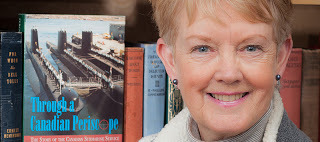 SSJ:Tell us about yourself.
SSJ:Tell us about yourself.
JHF: A non-fiction writer for 42 years and an avid photographer, I am also a hybrid author of twenty-one books— including four commercially published about Canadian history, six self-pubbed for writers and teachers, and six photo portfolios.
My articles and images have appeared in national and international markets, both print and online. I am also an addicted freelance travel writer and photographer.
My company, Beacon Literary Services, provides services to writers yearning to get either commercially or self-published, in book and magazine industries that are in constant upheaval.
I am proud to be a member of The Travel Media Association of Canada, the International Travel Writers Alliance, the BC Association of Travel Writers, and the Federation of BC Writers, as well as a former member of the Canadian Association of Professional Speakers.
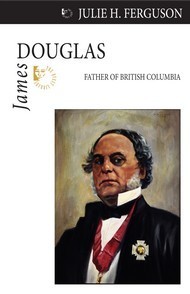 What's your latest book?My fourth traditionally published book is
James Douglas: Father of British Columbia
, a young adult biography (Dundurn 2009 – Quest Library series), which was voted one of the Best Nonfiction Books of 2010 for grades 7 to 12 by Resource Links Magazine for teachers. I’m also delighted to be able to say that JD has been enjoyed by as many adults as school students.This creative nonfiction adventure is mostly set in pre-Confederation Canada from 1803 to the end of JD’s life in 1877. Part-Black and illegitimate, fifteen year-old James Douglas sailed alone from Scotland to join the fur trade and later became the governor of the Colonies of Vancouver Island and British Columbia. The story weaves through the heart of Canadian history when BC was a wild land, Vancouver did not exist, and Victoria was a muddy village. The foreword is by Stephen Hume.
What's your latest book?My fourth traditionally published book is
James Douglas: Father of British Columbia
, a young adult biography (Dundurn 2009 – Quest Library series), which was voted one of the Best Nonfiction Books of 2010 for grades 7 to 12 by Resource Links Magazine for teachers. I’m also delighted to be able to say that JD has been enjoyed by as many adults as school students.This creative nonfiction adventure is mostly set in pre-Confederation Canada from 1803 to the end of JD’s life in 1877. Part-Black and illegitimate, fifteen year-old James Douglas sailed alone from Scotland to join the fur trade and later became the governor of the Colonies of Vancouver Island and British Columbia. The story weaves through the heart of Canadian history when BC was a wild land, Vancouver did not exist, and Victoria was a muddy village. The foreword is by Stephen Hume. How did you get started writing this book? Dundurn’s managing editor phoned me and asked me to write James Douglas for their biographical series for school libraries. I had not queried them nor did I have to write a book proposal because I had done two books with Dundurn before. This is one of the bonuses of being in a publisher’s stable of authors.Dundurn gave me only four months to do the research, creative writing, and revision. Fortunately, I knew the period well and some of the characters from work on a previous book. The work was brutally hard and all-consuming; I ate, slept, and dreamed of James Douglas. But I achieved the deadline and was satisfied with the manuscript.
What did you learn during the writing process? Can you give us any tips? To be honest, I would never undertake to research and write a book in such a short period again and, indeed, refused when Dundurn asked me to write another book in six months. I’ve learned since 1984, when I began work on Periscope, to immerse myself in as many original sources as I can find, write without the research beside my keyboard, and ruthlessly revise to meet my book’s overarching theme and throughlines. (I use the material I cut for my articles, etc., that promote the future book.)Also it is imperative to start getting articles pubbed on the nonfiction topic as soon as you can in markets that your book’s potential readers read; to create and activate your online presence years in advance of publication; and to speak on your subject whenever you can. Promotion needs to be relentless, both in person and online, well in advance of your book’s appearance and afterwards.
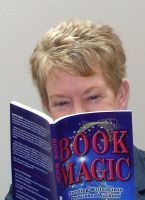 Tell us about your previous books.
Tell us about your previous books.
I have written two books about the Canadian Submarine Service: Through a Canadian Periscope: The Story ofthe Canadian Submarine Service (1995) and its sequel, Deeply Canadian: New Submarines for a New Millennium (2000). My next book for Dundurn was Sing a New Song: Portraits of Canada’sCrusading Bishops (2006), that features biographies of four BC Anglican bishops who changed the world. (The first, George Hills, was a contemporary of James Douglas.) I self-publish (print and electronic) my books for writers and teachers as mini-guides, and my own photo portfolios (print and iBooks). My overall-bestselling book is Book Magic: Turning Writers intoPublished Authors , now in its third edition, which is also self-published.
What is it that you like about British Columbia history? Almost forgotten, BC sat at the final frontier of the British Empire and was wild and unspoiled when the Europeans discovered it. Today, I can still see the same geography and nature they did—unchanged and beautiful. I often imagine what it must have been like to live then with no toilet paper, no running water, no medicines, no transportation but canoes and horses, and have to make journeys of five thousand plus miles each year to feed the fur trade. Every time I drive the highways in BC, I remember that am using those fur trade routes and seeing what they saw. It’s an amazing sensation that invigorates me to search out more about it and then write stories of the place and individuals in a way that lets our population discover their predecessors. Magic!
I feel exactly the same way about British Columbia, Julie!
What are you reading right now? · Above All Things by Tanis Rideout ( McClelland and Stewart 2012). A superb debut CNF biography of George Mallory who died on Everest in 1924. · Rough Passage to London by Robin Lloyd (Sheridan House, forthcoming). A fictional account of Ely Morgan, a famous trans-Atlantic packet (sailing ship) captain, who rose to master mariner from serving before the mast as a boy.
Tell us about your next project.I have just finished preparing my first book, Through a Canadian Periscope, for re-release in March 2014 to celebrate the centenary of the Canadian Submarine Service. It will be a trade paperback this time round with the images embedded in the text, a feature that pleases me. Technology has also meant that the old print images could be restored, which I did myself.I have also finished the first in a mid-grade novel series set on one of the last great sailing ships.
Anything else you’d like to add?Canadians who write well have a much better shot at getting published than Americans. We don’t need an agent to approach any Canadian publisher and our government extends grants to publishers, which assist those of us who write for small markets in keeping the Canadian voice not only alive, but loud.
How can people buy your book?All my books can be accessed through links on my website:History titles at http://www.beaconlit.com/#!historytitles/c15t5. Writers’ titles at http://www.beaconlit.com/#!books-miniguides/ct1m.
How can people find you on-line?
Beacon Literary Services' online presence includes:· Website: www.beaconlit.com · BLS Facebook biz page: www.facebook.com/BeaconLiteraryServices· The Beacon Blog for Writers: http://beaconlit.blogspot.com · Twitter: @BLSJHFerguson· Google+: https://plus.google.com/115278493724561706262/posts · LinkedIn: http://ca.linkedin.com/in/juliehfergusonAnd Julie's includes:· Through a Canadian Periscope: www.CanadianPeriscope.ca (New - January 2013) and www.facebook.com/CanadianPeriscope · My travelog: Stamps in My Passport: http://stampsinmypassport.blogspot.com· My YA biography blog: James Douglas: Father of BC: http://jamesdouglasofBC.blogspot.com· My online photography portfolio: www.juliehferguson.crevado.com · My travel videos and book trailers: www.youtube.com/user/beaconlit?feature=mhee
Published on June 10, 2013 19:43
June 7, 2013
The trouble with tribbles
Published on June 07, 2013 15:46


